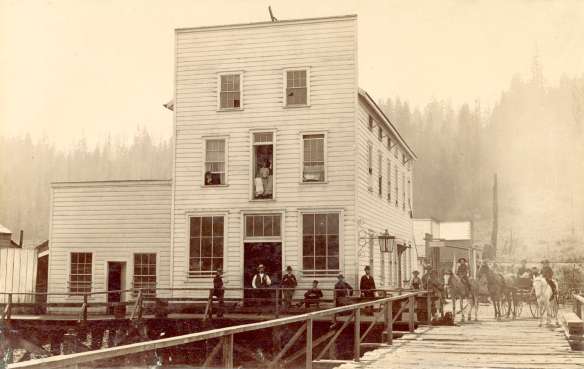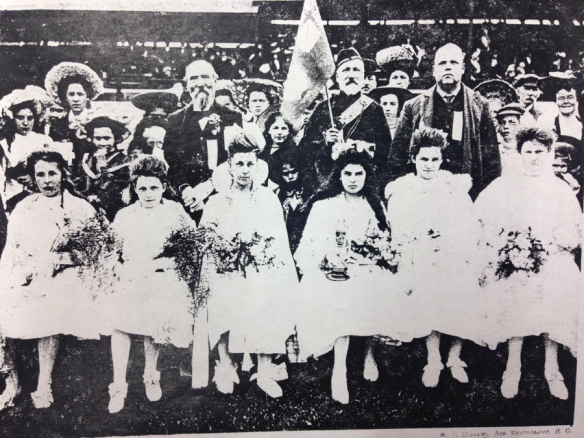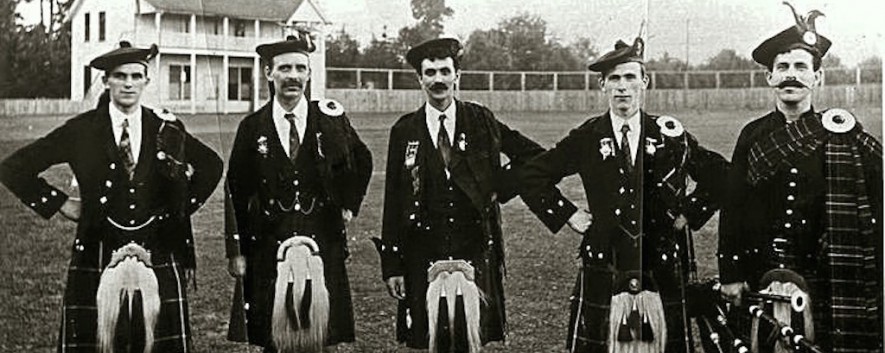This week’s blog comes from Jazmin Hundal. At press time, Jazmin was a history major and an International Studies minor at SFU. She has always had a passion for history and travel, often finding that she can travel the world through the lives of those who have made history. Jazmin has some family in Northern Ireland, and on her last visit there, became curious about nearby Scotland. She is immensely excited to have had the opportunity to learn a little about its people through her own research for Scottish history courses at SFU.
—
John Thomas Scott, a Scottish man born in Dunoon, led a life full of interest. While some of the facts surrounding his life may be questionable, as they come from small-scale newspapers that tended to report local lore as fact, the story that results is that of a real person. While elements may come across as fantastical, most of the events in his story were likely to have happened, and so are worth exploring here in this post.

Scott [n.d.] : New Westminster Archive Subject Files: Scott, File A.
Upon his return in 1834, Scott enlisted as a musician in the Thirteenth Argyleshire Rifles, with whom he traveled to Halifax, Nova Scotia. Twelve years later in 1846, Scott moved to Pennsylvania, and enlisted on the American side of the Mexican-American War (a conflict that ran from 1846-1848). Like some of his fellow Scottish volunteers, Scott registered himself beforehand under a different name, as John Thomas Dunoon. This shrewd move allowed him to continue to collect a pension from the American army for the rest of his life, even when he later moved to British Columbia.

Scott in military uniform. New Westminster Archive Subject Files: Scott, File A.
However, in terms of his military career in the American army, Scott was better known for his time spent as a Mexican prisoner of war. Injured at the Siege of Acapulco, he was taken prisoner by the Mexicans. It is not clear how long he was a prisoner of theirs, but it is clear what he claimed to have happened during that time. According to the reports of the newspapers, Scott learned the “Mexican language” (otherwise known as Spanish) from his captors, and quickly gained their trust. After having gained this trust, he led them into an ambush by the American army, through which he was freed and subsequently promoted to the title of sergeant.
While this last part of his story should be taken with a grain of salt, the next few decades of his life were likely to have happened. Scott is reported to have traveled to California to take part in the gold rush there in 1848 (after the Mexican-American War had ended). He didn’t find any gold; however, he did find a wife, a local woman named Elizabeth Ann Williams. Scott would have been thirty-six years old at the time, and his wife nineteen.
In 1858, after having their first child together, Scott and his wife traveled north to pursue the Cariboo Gold Rush along the Fraser River. After arriving in Victoria en route to the gold fields, Scott found employment at the Victoria Hotel before sending for his family to join him (today currently on the corner of Government and Courtney streets).

Col. J.T. Scott’s “Caledonia” Hotel in Port Moody [1886]. Courtesy City of Vancouver Archives AM54-S4-: Hot P19
After making this significant profit, the avid entrepreneur returned to New Westminster and invested a portion of this money into steam boating on the Fraser River. In 1863, he also found a calling in public office, as he was elected the to first New Westminster Health Board.
In 1865, tragedy struck the Scott family, as they lost three of their young children to premature deaths. Their seventeen month old, five year old, and six year old died of spasmodic croup, and were buried in the Douglas Road Cemetery. The drainage was apparently so poor in this area that the coffins had to be stood upon to keep them down while the soil was being shoveled onto them.
Five years later, in 1870, Scott was back in the public eye when he founded the May Day Celebrations in New Westminster. He was a key part in these celebrations, and was until he died.

Scott presiding over the May Day celebrations [n.d.]. New Westminster Archive Subject Files: Scott, File A.

Funeral procession in New Westminster, down Columbia Street, on February 16th, 1908. New Westminster Archive Subject Files: Scott, File A.

Gravestone. New Westminster Archive Subject Files: Scott, File A.
By the time of Scott’s death, he was a well-known public figure in New Westminster. Shown here are images of an invitation to his funeral procession, and of the lengthy procession itself, which went down Columbia Street on February 16th, 1908. His story was well known by the locals there, and he was regarded as an individual who had traveled the world and contributed greatly to the establishment of New Westminster. While it is likely that some elements of his story had been fictionalized (such as the tale of him gaining the trust of his Mexican captors and using it against them), his life tells us how ordinary men became local heroes in the mid to late nineteenth century. In the larger context of Scottish migration to B.C., he represented the adaptability and work ethic of Scottish emigrants to other settlers in the area. In addition, these newly formed communities clearly loved a good story, and were eager to accept one when it came their way. John Thomas Scott is proof of that, and was celebrated for the things he had done and may have done during his North American travels.
© Jazmin Hundal
Bibliography
New Westminster Archive Subject Files: Scott, File A.
“Col. Scott Passed Away Yesterday: Pioneer Resident of Lower Valley Died After Month’s Illness- Funeral Will Take Place Tomorrow.” Vancouver Daily Province, February 17th, 1908.
Green, George. “Early History of Burnaby and Vicinity.” The Advertiser, August 4th, 1939.
McCaig, Mark. “J.T. Scott and the Pioneer Saloon.”
Story, Wanda. “John Thomas Scott: 1821-1908.” December, 1992.

Pingback: Canadian History Roundup – Week of June 12, 2016 | Unwritten Histories
Thank you for the information about Col. J. T. Scott, this was a very interesting read! I am supposed to be related to him somehow, will have to clarify exactly how next time I see my grandmother. Cheers 🙂
LikeLike
This is my Grandfather
LikeLike
Hi Rob… mY dad would love to reach out to your mom. His dad was Hugh Scott. Her older brother. His name is Dick Scott on FB or I am Shelley Arding
LikeLike
My mother…Shirley Scott 1947 youngest daughter of Loftus Robert Scott 1876 youngest son of John Thomas Scott.
LikeLiked by 1 person
This is my great great great grandfather. I’m Cheyenne Scott daughter of Charlotte Scott . My great grandmother was Doreen Scott .
LikeLike
This is my Great Great Grandfather. My mothers father being a son of Loftus. Great read!
LikeLike
That’s really neat! Thanks for reading; the students work so hard on these posts and it’s really great to see people discovering their ancestors on here.
LikeLike
This is my family ! I’m Cheyenne Scott . That’s my great great great grandfather . I have alot of information about the Scott family if you are interested still .
LikeLike
Can you find me on Facebook? Black and White dog as background pic and I’m on Vancouver Island in CR.
LikeLike
Recently found info that says he was born in County Tyrone Northern Ireland near Dunganoon?
LikeLike
You would be a cousin of my dad. His dad was Hugh. He would love to reach out to your mom Shirley. Dad lives in Maple Ridge
LikeLike
My grandmother is Arlene Scott my great grandmother is Doreen Scott . This is my great great grandfather
LikeLike
My Grandmother (your Aunt through marriage), Dave’s wife, would like to get in contact with you too Rob. Dave having been one your Mom’s brothers.
LikeLike